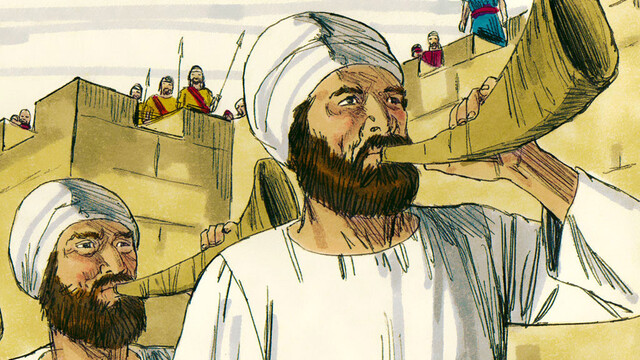Why Did Job’s Three Friends Have to Sacrifice Before Job (Job 42:7-10)?
The Bible records, “And it was so, that after Jehovah had spoken these words to Job, Jehovah said to Eliphaz the Temanite, My wrath is kindled against you, and against your two friends: for you have not spoken of Me the thing that is right, as My servant Job has. Therefore take to you now seven bullocks and seven rams, and go to My servant Job, and offer up for yourselves a burnt offering; and My servant Job shall pray for you: for him will I accept: lest I deal with you after your folly, in that you have not spoken of Me the thing which is right, like My servant Job. So Eliphaz the Temanite and Bildad the Shuhite and Zophar the Naamathite went, and did according as Jehovah commanded them: Jehovah also accepted Job. And Jehovah turned the captivity of Job, when he prayed for his friends: also Jehovah gave Job twice as much as he had before” (Job 42:7-10). From these scriptures, I saw that Job had a heart that feared God in the trials. He did not sin with his mouth, and often pondered and sought God’s will. Thus, when he was besieged by Satan, he could hold on to his integrity and stand witness for God with his astonishing actions as well as the archetypal words spoken by him, which made Satan feel ashamed and then flee. Job’s testimony is actually admirable and is worthy of emulation. But there was something I could not understand: When Job was undergoing the trials, his three friends said some words of judgment and attack against him. They did not understand God’s will, neither did they know what God wished to achieve through such trials; this caused them to carelessly judge God. Yet, why did God not deal with them for their foolishness? Why did God not directly ask them to atone for their sins by offering burnt offerings, but rather told them go to Job’s home to offer burnt offerings for themselves? And why did He ask Job to pray for them? What on earth was God’s will behind this?
I did not understand these questions until I saw a piece of God’s word “God’s Work, God’s Disposition, and God Himself II.” Only then did I get the answer and come to know the reason why God asked Job’s three friends to offer burnt offerings to Job. It turned out that there is meaning behind this.
God says, “God first said to Eliphaz the Temanite: ‘My wrath is kindled against you, and against your two friends: for you have not spoken of Me the thing that is right, as My servant Job has.’ These words are the first time that God had openly told people that He accepted all that was said and done by Job after God’s trials of him, and are the first time that He had openly confirmed the accuracy and correctness of all that Job had done and said. God was angry at Eliphaz and the others because of their incorrect, absurd discourse, because, like Job, they could not see the appearance of God or hear the words He spoke in their lives, yet Job had such an accurate knowledge of God, whereas they could only blindly guess about God, violating God’s will and trying His patience in all that they did. Consequently, at the same time as accepting all that was done and said by Job, God grew wrathful toward the others, for in them He was not only unable to see any reality of fear of God, but also heard nothing of the fear of God in what they said. And so God next made the following demands of them: ‘Therefore take to you now seven bullocks and seven rams, and go to My servant Job, and offer up for yourselves a burnt offering; and My servant Job shall pray for you: for him will I accept: lest I deal with you after your folly.’ In this passage God is telling Eliphaz and the others to do something that will redeem their sins, for their folly was a sin against Jehovah God, and thus they had to make burnt offerings in order to remedy their mistakes. Burnt offerings are often offered to God, but what is unusual about these burnt offerings is that they were offered to Job. Job was accepted by God because he bore testimony to God during his trials. These friends of Job, meanwhile, were exposed during the time of his trials; because of their folly, they were condemned by God, and they incited the wrath of God, and should be punished by God—punished by making burnt offerings before Job—after which Job prayed for them to dispel God’s punishment and wrath toward them. God’s intention was to bring shame upon them, for they were not people who feared God and shunned evil, and they had condemned the integrity of Job. In one regard, God was telling them that He did not accept their actions, but greatly accepted and took delight in Job; in another, God was telling them that being accepted by God elevates man before God, that man is loathed by God because of his folly, and offends God because of it, and is lowly and vile in God’s eyes. These are the definitions given by God of two types of people, they are God’s attitudes toward these two types of people, and they are God’s articulation of the worth and standing of these two types of people. Even though God called Job His servant, in God’s eyes this servant was beloved, and was bestowed with the authority to pray for others and forgive them their mistakes. This servant was able to talk directly to God and come directly before God, and his status was higher and more honorable than those of others. This is the true meaning of the word ‘servant’ spoken by God. Job was given this special honor because of his fear of God and shunning of evil, and the reason why others were not called servants by God is because they did not fear God and shun evil. These two distinctly different attitudes of God are His attitudes toward two types of people: Those who fear God and shun evil are accepted by God and seen as precious in His eyes, while those who are foolish do not fear God, are incapable of shunning evil, and are not able to receive God’s favor; they are often loathed and condemned by God, and are lowly in God’s eyes.”
“Job prayed for his friends, and afterward, because of Job’s prayers, God did not deal with them as befitted their folly—He did not punish them or take any retribution upon them. Why was that? It was because the prayers made for them by God’s servant, Job, had reached His ears; God forgave them because He accepted Job’s prayers. So, what do we see in this? When God blesses someone, He gives them many rewards, and not just material ones: God also gives them authority, entitles them to pray for others, and God forgets and overlooks those people’s transgressions, because He hears these prayers. This is the very authority that God gave to Job. Through Job’s prayers to halt their condemnation, Jehovah God brought shame upon those foolish people—which, of course, was His special punishment for Eliphaz and the others.”
After reading God’s words, I understood: Owing to his fear of God and shunning of evil, Job was seen as precious in God’s eyes, and thereby Jehovah God kindly called him His servant and bestowed authority upon him. As for Job’s three friends, they were not the ones who feared God and shunned evil. Although they could speak so many spiritual doctrines, yet when encountering things, they looked at them on the surface, and made arbitrary judgments and conclusions. They did not seek God’s will, much less know God’s work. So, God condemned them as the foolish people opposing God. They were seen as lowly by God and were detested by Him. On the contrary, God took delight in Job. Thus He asked Job’s three friends to make burnt offerings to him. This is also decided by God’s righteous disposition. He wanted to make them know that Job, whom they condemned and abandoned, was the one whom God took delight in, and to make them see that those who feared God and shunned evil were the ones God treasured and wanted to make perfect as well as the ones they should respect and emulate. God took delight in Job, so He asked Job to pray for his three friends and then forgave them and overlooked their transgressions. This is the very authority that God gave to Job. Without Job’s prayer for them, God would get angry with and punish them. Clearly, Job weighed heavy on God’s heart. For those who fear God and shun evil like Job, God bestows authority on them as well as listens to their prayers. For those who only speak letters and doctrines and merely know spiritual doctrines, but do not have a heart that fears God, God does not listen to their prayers because they often judge God’s work, do not seek God at all, and only follow set rules. They are those who resist God and are hated by God; they very easily offend God’s disposition. God bestows the authority upon those who are loved by Him and able to come directly before Him, so that they have the right to pray for others and thereby to pardon them their transgressions. Meanwhile, God shames those foolish people in this way, this is a special punishment for them. Through this, God shows us that only those who fear God and shun evil can be seen as high by Him; contrarily, those foolish people who do not fear God are seen as lowly by Him. These are God’s different attitudes toward the two kinds of people. That is also God’s meaning in asking Job’s three friends to offer burnt offerings to Job.
From this, I saw that God’s righteous disposition is intolerant of offense by man. And I also saw God observes the deepest parts of man’s heart and what He cares about is our heart. All of our thoughts and ideas cannot escape God’s sight. Thus, God hopes we can accept His observation in speaking and acting. When encountering all kinds of trials or things that are not in accordance with our notions, we ought to follow Job’s example and seek God’s will through prayers; instead of sinning with our mouth, being influenced by the people, events, or things around us, and following the herd and doing what everyone else does, we should hold firm to our integrity before God and stand witness for Him to shame Satan. If, when encountering things, we are just like Job’s three friends, and do not seek and explore God’s will, do not have a heart that fears God, but arbitrarily judge and arrive at arbitrary conclusions, and condemn God’s work, then we will be the failures even if we believe to the very end. Through these two kinds, we come to know what type of people God likes, what type of people He hates, and what type of people He has mercy on, what type of people He eliminates. If we do not pursue walking the path of fearing God and shunning evil, and if, whatever we encounter, we do not have a heart that fears God and do not seek and pray, but speak carelessly and make blind judgments before we have grasped God’s will accurately, then we will very easily offend God’s disposition.
- 1Why Is It Hard for a Rich Man to Enter God’s Kingdom?
- 2What Is the Meaning of the Parable of the New Cloth and Old Garment?
- 3What Do the Overcomers in the Bible Refer To?
- 4What Does John 3:36 Mean?
- 5What Is the Church of Philadelphia in the Bible?
- 6Are You Really Worshiping the Lord Jesus at Christmas?









